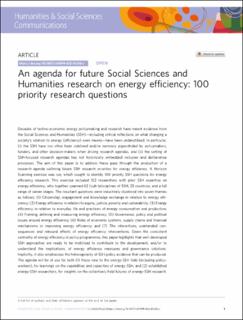An agenda for future Social Sciences and Humanities research on energy efficiency: 100 priority research questions
| dc.contributor.author | Foulds, Chris | |
| dc.contributor.author | Royston, Sarah | |
| dc.contributor.author | Berker, Thomas | |
| dc.contributor.author | Nakopoulou, Efi | |
| dc.contributor.author | Bharucha, Zareen Pervez | |
| dc.contributor.author | Robison, Rosie | |
| dc.contributor.author | Abram, Simone | |
| dc.contributor.author | Ančić, Branko | |
| dc.contributor.author | Arapostathis, Stathis | |
| dc.contributor.author | Badescu, Gabriel | |
| dc.contributor.author | Bull, Richard | |
| dc.contributor.author | Cohen, Jed | |
| dc.contributor.author | Dunlop, Tessa | |
| dc.contributor.author | Dunphy, Niall | |
| dc.contributor.author | Dupont, Claire | |
| dc.contributor.author | Fischer, Corinna | |
| dc.contributor.author | Gram-Hanssen, Kirsten | |
| dc.contributor.author | Grandclément, Catherine | |
| dc.contributor.author | Heiskanen, Eva | |
| dc.contributor.author | Labanca, Nicola | |
| dc.contributor.author | Jeliazkova, Maria | |
| dc.contributor.author | Jörgens, Helge | |
| dc.contributor.author | Keller, Margit | |
| dc.contributor.author | Kern, Florian | |
| dc.contributor.author | Lombardi, Patrizia | |
| dc.contributor.author | Mourik, Ruth | |
| dc.contributor.author | Ornetzeder, Michael | |
| dc.contributor.author | Pearson, Peter J. G. | |
| dc.contributor.author | Rohracher, Harald | |
| dc.contributor.author | Sahakian, Marlyne | |
| dc.contributor.author | Sari, Ramazan | |
| dc.contributor.author | Standal, Karina | |
| dc.contributor.author | Živčič, Lidija | |
| dc.date.accessioned | 2022-11-21T08:13:14Z | |
| dc.date.available | 2022-11-21T08:13:14Z | |
| dc.date.created | 2022-08-26T09:49:05Z | |
| dc.date.issued | 2022 | |
| dc.identifier.citation | Humanities & Social Sciences Communications. 2022, 9 (1), . | en_US |
| dc.identifier.issn | 2662-9992 | |
| dc.identifier.uri | https://hdl.handle.net/11250/3033026 | |
| dc.description.abstract | Decades of techno-economic energy policymaking and research have meant evidence from the Social Sciences and Humanities (SSH)—including critical reflections on what changing a society’s relation to energy (efficiency) even means—have been underutilised. In particular, (i) the SSH have too often been sidelined and/or narrowly pigeonholed by policymakers, funders, and other decision-makers when driving research agendas, and (ii) the setting of SSH-focused research agendas has not historically embedded inclusive and deliberative processes. The aim of this paper is to address these gaps through the production of a research agenda outlining future SSH research priorities for energy efficiency. A Horizon Scanning exercise was run, which sought to identify 100 priority SSH questions for energy efficiency research. This exercise included 152 researchers with prior SSH expertise on energy efficiency, who together spanned 62 (sub-)disciplines of SSH, 23 countries, and a full range of career stages. The resultant questions were inductively clustered into seven themes as follows: (1) Citizenship, engagement and knowledge exchange in relation to energy efficiency; (2) Energy efficiency in relation to equity, justice, poverty and vulnerability; (3) Energy efficiency in relation to everyday life and practices of energy consumption and production; (4) Framing, defining and measuring energy efficiency; (5) Governance, policy and political issues around energy efficiency; (6) Roles of economic systems, supply chains and financial mechanisms in improving energy efficiency; and (7) The interactions, unintended consequences and rebound effects of energy efficiency interventions. Given the consistent centrality of energy efficiency in policy programmes, this paper highlights that well-developed SSH approaches are ready to be mobilised to contribute to the development, and/or to understand the implications, of energy efficiency measures and governance solutions. Implicitly, it also emphasises the heterogeneity of SSH policy evidence that can be produced. The agenda will be of use for both (1) those new to the energy-SSH field (including policyworkers), for learnings on the capabilities and capacities of energy-SSH, and (2) established energy-SSH researchers, for insights on the collectively held futures of energy-SSH research. | en_US |
| dc.language.iso | eng | en_US |
| dc.publisher | Springer Nature | en_US |
| dc.rights | Navngivelse 4.0 Internasjonal | * |
| dc.rights.uri | http://creativecommons.org/licenses/by/4.0/deed.no | * |
| dc.title | An agenda for future Social Sciences and Humanities research on energy efficiency: 100 priority research questions | en_US |
| dc.title.alternative | An agenda for future Social Sciences and Humanities research on energy efficiency: 100 priority research questions | en_US |
| dc.type | Peer reviewed | en_US |
| dc.type | Journal article | en_US |
| dc.description.version | publishedVersion | en_US |
| dc.source.pagenumber | 0 | en_US |
| dc.source.volume | 9 | en_US |
| dc.source.journal | Humanities & Social Sciences Communications | en_US |
| dc.source.issue | 1 | en_US |
| dc.identifier.doi | 10.1057/s41599-022-01243-z | |
| dc.identifier.cristin | 2046224 | |
| dc.relation.project | EC/H2020/826025 | en_US |
| cristin.ispublished | true | |
| cristin.fulltext | original | |
| cristin.qualitycode | 1 |

